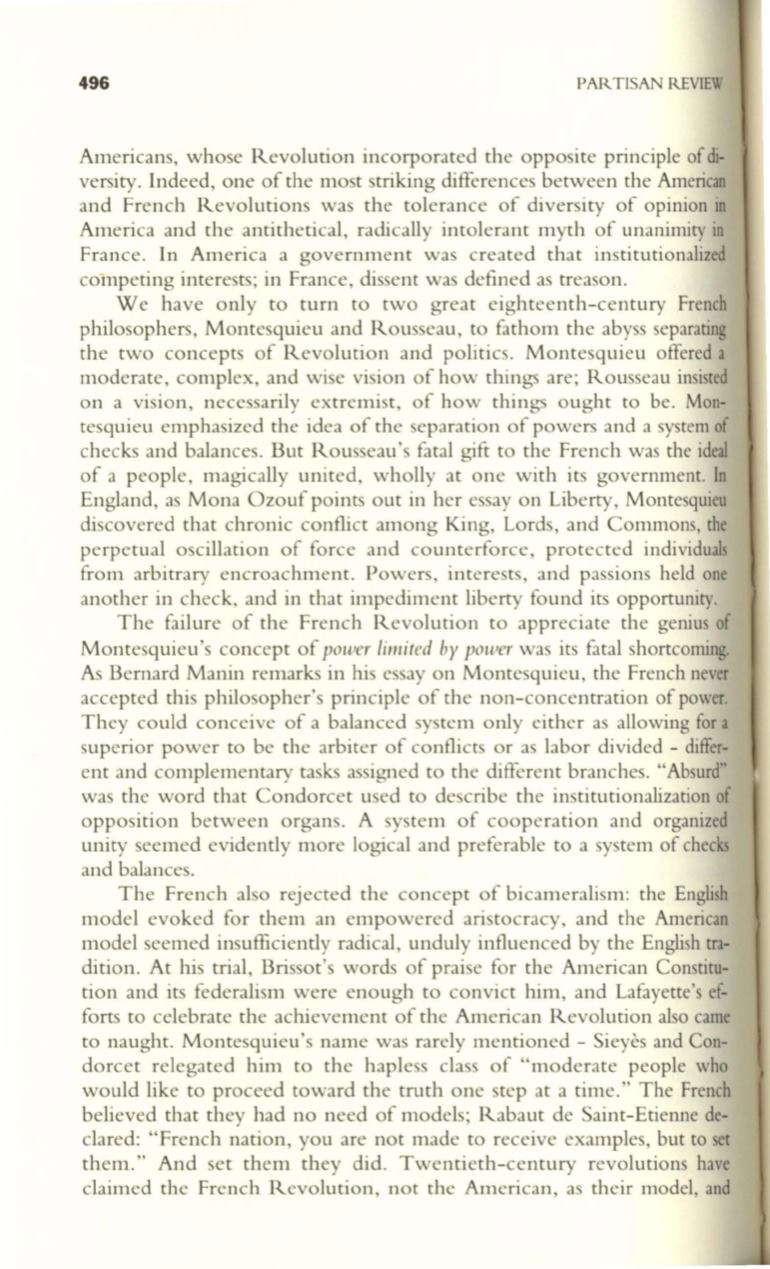
496
PARTISAN REVIEW
Americans, whose Revolution incorporated the opposite principle of
di–
versity. Indeed, one of the most striking differences between the American
and French Revolutions was the tolerance of diversity of opinion in
America and the antithetical, radically intolerant myth of unanimity in
France. In America a government was created that institutionalized
competing interests; in France, dissent was defined as treason.
We have only to turn to two great eighteenth-century French
philosophers, Montesquieu and Rousseau, to fathom the abyss separating
the two concepts of Revolution and politics. Montesquieu offered a
moderate, complex, and wise vision of how things are; Rousseau insisted
on a vision, necessarily extremist, of how things ought to be. Mon–
tesquieu emphasized the idea of the separation of powers and a system of
checks and balances. But Rousseau's fatal gift to the French was the ideal
of a people, magically united, wholly at one with its government. In
England, as Mona Ozouf points out in her essay on Liberty, Montesquieu
discovered that chronic conflict among King, Lords, and Commons, the
perpetual oscillation of force and counterforce, protected individuals
from arbitrary encroachment. Powers, interests, and passions held one
another in check, and in that impediment liberty found its opportunity.
The failure of the French Revolution to appreciate the genius of
Montesquieu's concept of
power limited
by
power
was its fatal shortcoming.
As Bernard Manin remarks in his essay on Montesquieu, the French never
accepted this philosopher's principle of the non-concentration of power.
They could conceive of a balanced system only either as allowing for a
superior power
to
be the arbiter of conflicts or as labor divided - differ–
ent and complementary tasks assigned to the different branches. "Absurd"
was the word that Condorcet used to describe the institutionalization of
opposition between organs. A system of cooperation and organized
unity seemed evidently more logical and preferable to a system of checks
and balances.
The French also rejected the concept of bicameralism: the English
model evoked for them an empowered aristocracy, and the American
model seemed insufficiently radical, unduly influenced by the English tra–
dition. At his trial, Brissot's words of praise for the American Constitu–
tion and its federalism were enough to convict him, and Lafayette's ef–
forts to celebrate the achievement of the American Revolution also came
to naught. Montesquieu's name was rarely mentioned - Sieyes and Con–
dorcet relegated him to the hapless class of "moderate people who
would like to proceed toward the truth one step at a time." The French
believed that they had no need of models; Rabaut de Saint-Etienne de–
clared: "French nation, you are not made to receive examples, but to set
them." And set them they did. Twentieth-century revolutions have
claimed the French Revolution, not the American, as their model, and


